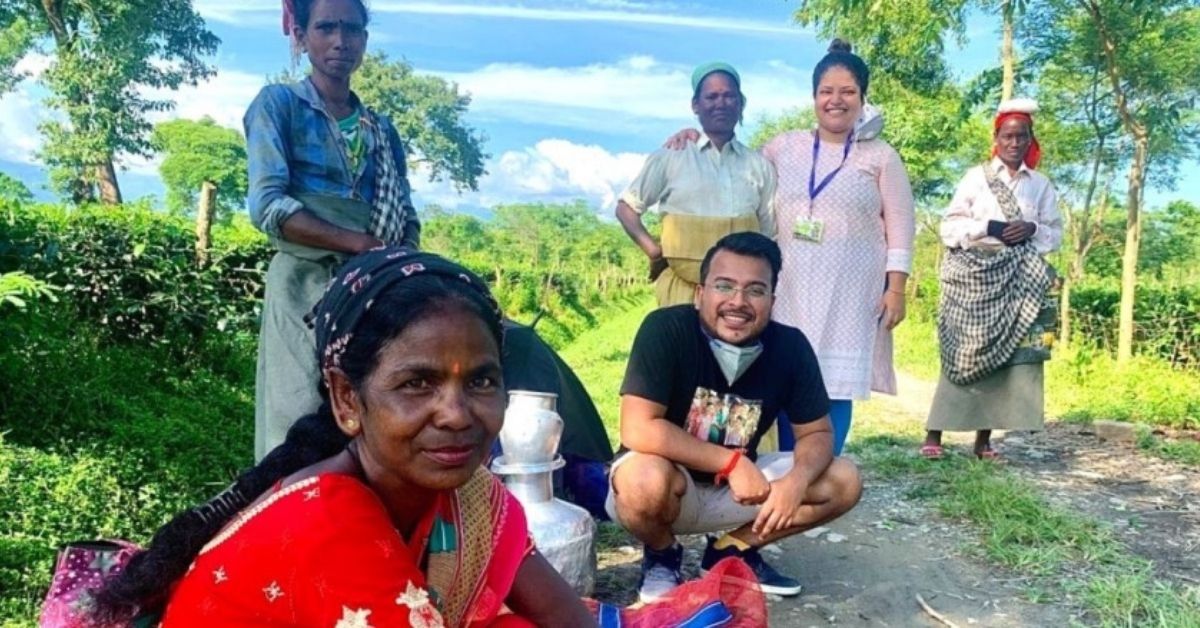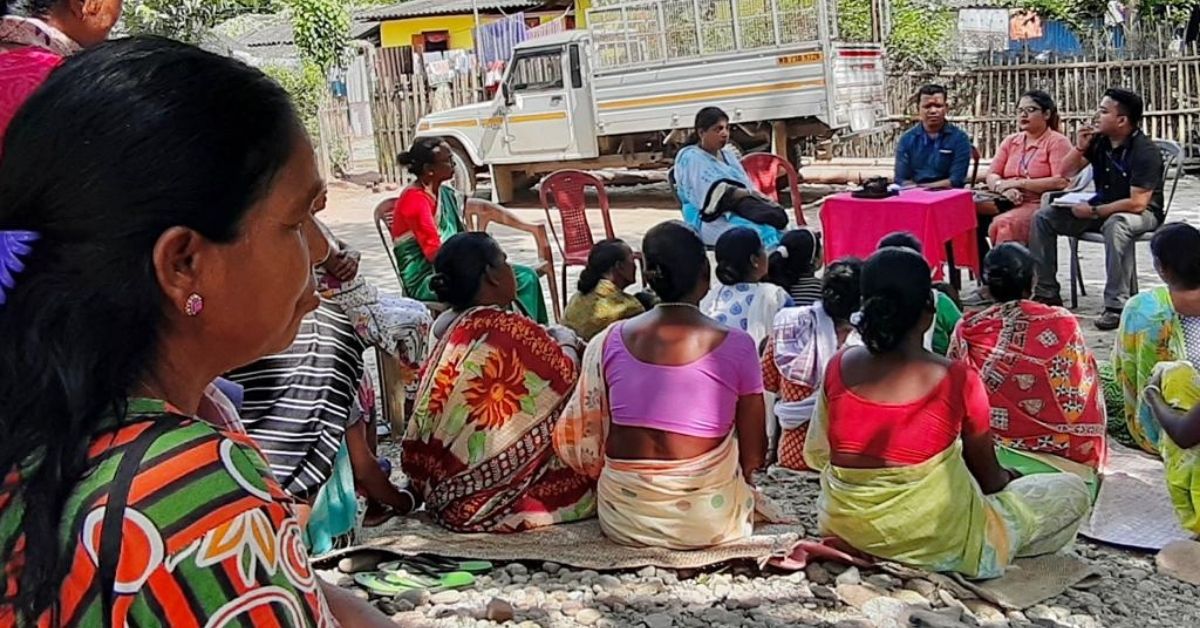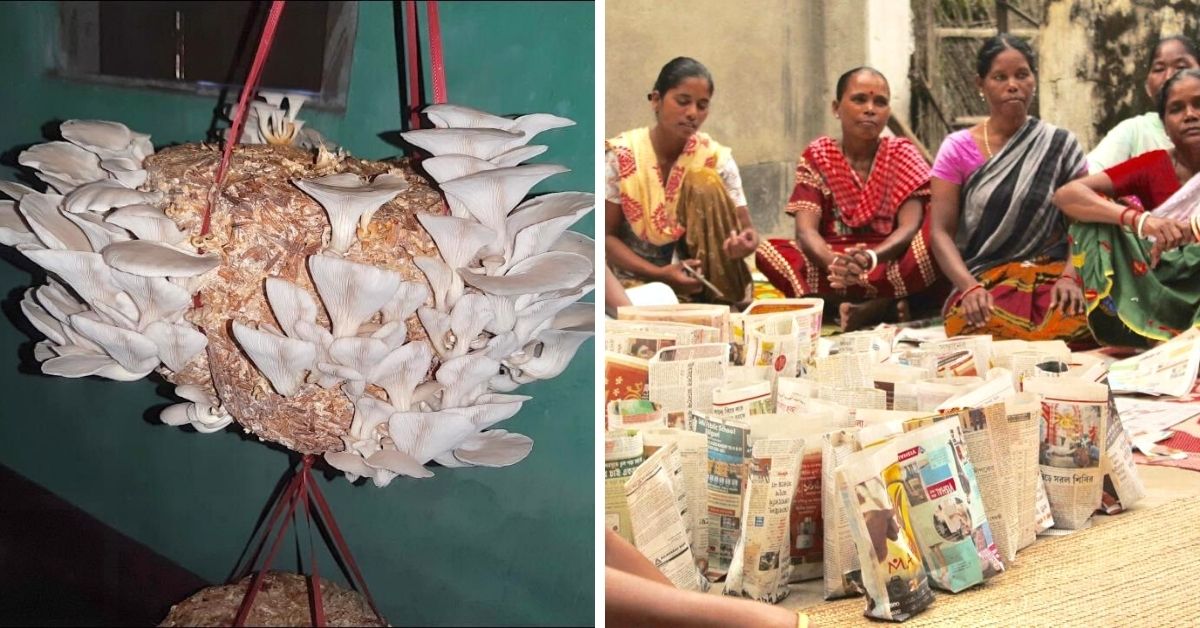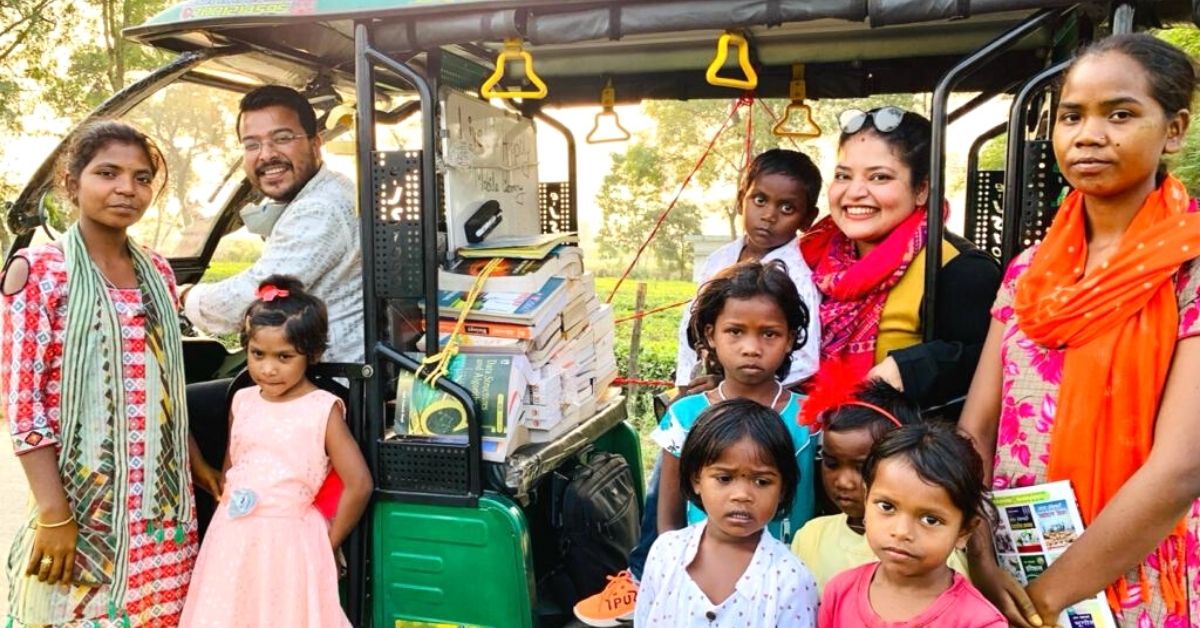7200 Tea Garden Workers Have Better Lives, Thanks to These IIT Grads & Mushrooms!
Anirban and Polumi Nandy run Live Life Happily NGO, which as helped thousands of women across Siliguri earn more with mushroom farming, encouraging them to be financially independent

After the Partition, Atul Nandy and his family migrated to Siliguri from Bangladesh, where they settled into a life of agriculture, growing food for a living. But as a farmer living in a remote part of the country, he faced multiple hardships.
Anirban, Atul’s son, closely witnessed all the difficulties that his father experienced. “Many farmers, like my father, belonged to neighbouring Nepal and Bhutan, having migrated years ago. They were mainly tea planters or labourers who faced a lot of losses due to geopolitical barriers. The geographical location made access to equipment and modern agriculture difficult. Moreover, man-animal conflict with elephants and leopards damaging the crops only worsened the crisis,” Anirban tells The Better India.
However, since 2015, Anirban and his wife Poulami have been scripting a new chapter for these farmers. So far, they have trained thousands in mushroom farming, helping them earn an alternate source of livelihood.
Mission to elevate livelihoods

An alumnus of IIT-Kharagpur, Anirban completed his post-graduation in engineering, specialising in the rural development sector. “My academics and a fellowship earned in 2015 demanded frequent visits to the rural parts of India. I focused my research on sub-Himalayan districts of Darjeeling, Jalpaiguri, others understanding the fate of farmers,” he says.
Anirban learned that migrant farmers in the region either had a small piece of land, or leased one for developing tea gardens. Many other migrants, especially women, worked as farm labourers to earn a living.
His observations revealed that owning farmland was crucial for such migrants to gain financial security and protect themselves from exploitation from landowners. “Without self-owned land, farmers found it difficult to access loans from banks or leveraging any collateral against the loan,” the 32-year-old explains.
Anirban decided to understand their situation closely and find a solution for it.
“Researchers conduct plenty of work by gathering data, analysing, and understanding the nitty-gritties of a problem to draw a conclusion and come to a potential solution. However, such crucial information ends up as a report file shelved in a library or tiny corner of the researcher’s home. I wanted to make use of the data to improve the lives of farmers in the region,” he says.
He adds, “Local villagers or farmers who participate in the research share data with the hope that the ground realities they share would one day benefit them. If I failed to use the information, the hard work would go in vain.”
Anirban says his thought of helping farmers in remote parts of India was rare. Moreover, he found that the plight of women in such regions was as harrowing, if not worse. “During the research, I found many women undergoing domestic violence and other forms of abuse for years. The sole reason for their oppression was that they were not decision-makers in the family, and were unskilled,” he says.
He says the women working at the plantations pluck tea leaves and have no other skill set. “They have limited education and less access to platforms to empower themselves. Moreover, they are confined to remote geographical areas and cannot venture away from home for better livelihood opportunities,” he explains.
Anirban says that some women lose crops or earnings due to damages incurred by wildlife. “Some others lose their husbands while he is inside the forest seeking wood or other forest resources. Such women struggle to make ends meet. Hence, the alternative income source had to generate in their comfort space,” he says.
Anirban’s findings, coupled with his experiences with agriculture and watching how his father suffered, encouraged him to work for the betterment of these women. So the couple decided to deliver mushroom growing lessons to empower women.

“Learning to grow mushrooms is a feasible and manageable task. The women can even grow it in a corner of their house as a part-time activity or hobby without needing farmland. Mushrooms also have considerable demand in the market, especially in cosmopolitan areas like Darjeeling, thus ensuring quick income,” he says.
Poulami says she started approaching women in the villages to form groups. “I reached out to some Self Help Groups (SHGs) that already existed to connect with and convince the women to grow mushrooms as an alternate source of livelihood,” she says.
She formed a group of 10-12 enthusiastic women who expressed willingness to pursue the activity. “We demonstrated and handheld women in growing mushrooms. The mushrooms were sold in the nearby market, and the income impressed them. Slowly, others joined in,” Poulumi says.
The couple travelled door-to-door in every village, convincing villagers and training. “Initially, we stood in the market to sell the mushrooms grown by women for Rs 130 a kilo. There was no money for packaging, and we derived one from used newspapers,” she says.
Poulami says that at present, each woman grows about 25-30 kilos at a time, earning at least Rs 4,000 from a single harvest.
Fulrida, one of the beneficiaries from Gangaram village, says, “I lost my husband due to prolonged illness in 2019. I also lost my only source of income and decided to learn how to grow mushrooms. It seemed a convenient concept, and today I earn a monthly income of Rs 7,000.”
The 55-year-old woman says the income helps her meet daily expenses without investing much or spending on travel expenses for a job.
Beyond mushroom farming
After earning initial success in empowering women and becoming confident in their work, the couple set up Live Life Happily NGO to bring a formal structure for their work. To date, they have helped 7,200 women from over 30 villages earn additional income, resolve domestic violence and create sensitisation on man-animal conflict.
Poulami says that at present, an additional 1,000 women are undergoing training. “These women have gained bargaining power in their house and become decision-makers. There has been an instance where a woman refused to marry her daughter at an early age because she was able to manage funding her education with mushroom farming,” she says.
Meanwhile, she adds, in some houses, the cases of domestic violence have also reduced as the wife has become financially independent.
She adds that the women also feel confident in their product and marketing skills, which they did not earlier. “The COVID-19 lockdown resulted in job loss and income reduction for tea plantation workers and led many women to take up mushroom cultivation to earn a livelihood,” she says.

Behind the successful picture witnessed at present, Poulumi says there were difficult days where the couple struggled to gain the women’s trust. “At times, they ran away and found excuses to not attend mushroom training workshops. But today, women line up wanting to learn the skills,” she says.
Anirban says that after witnessing the women’s success, Atul has also started mushroom farming. “I feel glad that he can earn an additional income after years of struggling,” he adds.
Besides, the couple works on creating awareness among villagers on man-animal conflict.
“In a recent case reported in April 2021, a woman Kiranti Asur lost her husband in an elephant attack after he went inside a forest to fetch wood. Such cases are common in the area. Hence, we inform villagers not to step out from their homes during dark hours as wild animals move out of the forest during the evening and late evening hours. We also impart skills on how to avoid conflict situations and prevent harm to human lives,” Anirban says.
The couple also pleads with the forest department officials to issue remuneration for the death of a family member or cattle in such cases.
On a parting note, Anirban says, “We aim to deliver happiness to the lives of these women. Many people from various sectors of society speak about working for the underprivileged, but there are talks and no action in bettering their lives. It would have been convenient for us to seek a job in a multinational company and move abroad for better career prospects. But we chose to take the initiative as a challenge and make it a success.”
Edited by Divya Sethu
If you found our stories insightful, informative, or even just enjoyable, we invite you to consider making a voluntary payment to support the work we do at The Better India. Your contribution helps us continue producing quality content that educates, inspires, and drives positive change.
Choose one of the payment options below for your contribution-
By paying for the stories you value, you directly contribute to sustaining our efforts focused on making a difference in the world. Together, let’s ensure that impactful stories continue to be told and shared, enriching lives and communities alike.
Thank you for your support. Here are some frequently asked questions you might find helpful to know why you are contributing?


This story made me
-
97
-
121
-
89
-
167











